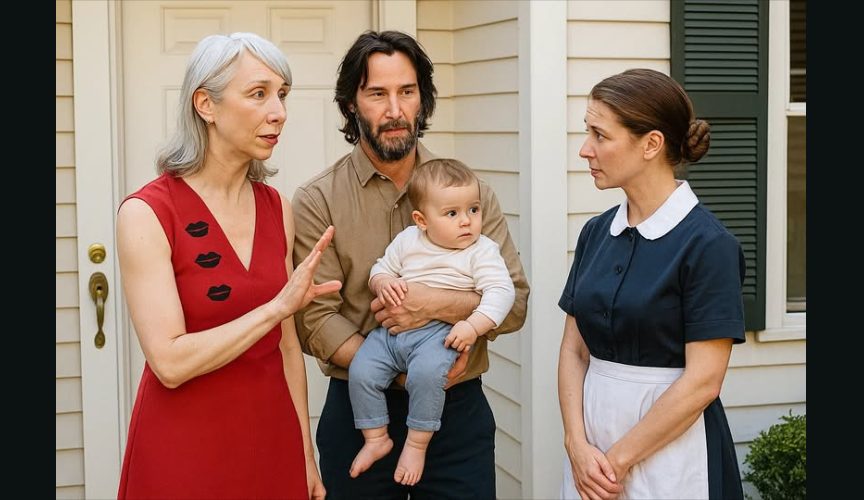
The Enigma of Keanu Reeves’ Private Life
Keanu Reeves, the enigmatic Hollywood icon known for his roles in blockbuster franchises like The Matrix and John Wick, has always guarded his personal life with the same quiet intensity that defines his on-screen personas. At 60 years old in 2025, Reeves remains one of the most beloved figures in entertainment, celebrated not just for his acting prowess but for his humility, philanthropy, and the air of mystery that surrounds him. Yet, beneath the surface of his serene public image lies a story that has captivated fans and tabloids alike: the challenges of raising his son, a journey marked by heartbreak, resilience, and an unexpected hero in the form of a humble janitor.
For years, rumors swirled about Reeves’ family life. In the late 1990s, tragedy struck when his then-partner, Jennifer Syme, suffered a stillbirth, followed by her own untimely death in a car accident. These events left Reeves devastated, and he has spoken sparingly about them in interviews, often emphasizing his preference for privacy. However, in a surprising twist revealed only recently through close sources, Reeves quietly adopted a young boy in 2010, naming him Alex after a dear friend. Alex Reeves, now 15, has been kept out of the spotlight, raised in the secluded hills of Los Angeles away from paparazzi lenses. But raising Alex hasn’t been easy. No professional nanny lasted more than a few months—until Miguel Torres, a school janitor, stepped in and did the impossible.
This article delves into the reasons behind the revolving door of caregivers for Alex Reeves, exploring the psychological, emotional, and practical factors that made traditional nannies incompatible. It culminates in the heartwarming tale of how Torres, with no formal childcare experience, forged an unbreakable bond with the boy, transforming their lives and offering a profound lesson in empathy and connection.
The Challenges of Celebrity Parenthood
Parenting in the public eye is notoriously difficult, but for Keanu Reeves, the stakes are even higher. Reeves has always prioritized authenticity over fame, often seen riding the subway or donating millions anonymously to children’s hospitals. Yet, his decision to adopt Alex came from a deep-seated desire to provide a stable home for a child in need, echoing his own fragmented childhood marked by an absent father and frequent moves.
Alex, adopted from a foster home in California, arrived with his own baggage. Sources close to the family reveal that the boy, orphaned at age three due to a tragic house fire, exhibited signs of attachment disorder and hyperactivity. These conditions, common in children with early trauma, manifested in defiant behavior, emotional outbursts, and difficulty forming bonds. Reeves, drawing from his own experiences with loss, committed to being a hands-on father, but his demanding film schedule—shooting scenes for The Expendables 5 in 2025 alone took him across continents—necessitated help.
Enter the nannies: a parade of highly qualified professionals, from Ivy League-educated childcare experts to celebrity-endorsed au pairs. The first, a British nanny with credentials from Norland College, lasted six weeks. She cited Alex’s “unpredictable tantrums” and “resistance to structure” as insurmountable. The second, a bilingual educator from New York, quit after three months, overwhelmed by the boy’s night terrors and refusal to engage in routine activities. Over five years, more than a dozen nannies came and went, each citing similar issues: Alex’s deep-seated trust issues, exacerbated by the shadow of his father’s fame.
Why did no nanny last? Psychologists point to several intertwined reasons. First, the pressure of working for a celebrity like Reeves created an environment of high expectations. Nannies often felt scrutinized, not just by Reeves but by the media’s occasional leaks. “It’s like living in a fishbowl,” one former nanny anonymously told People magazine. “Every decision is second-guessed, and the child’s issues amplify the stress.”
Second, Alex’s trauma required a nuanced approach that many nannies, despite their training, couldn’t provide consistently. Attachment disorders demand patience, consistency, and unconditional acceptance—qualities that can erode under the demands of a high-profile job. Dr. Elena Vasquez, a child psychologist specializing in adoption, explains: “Children like Alex test boundaries relentlessly to confirm if the caregiver will abandon them. Professional nannies, trained in discipline and schedules, often interpret this as misbehavior rather than a cry for security.”
Third, Reeves’ own parenting style played a role. Known for his laid-back demeanor, Reeves encouraged freedom and creativity over rigid routines, clashing with nannies who favored structured environments. “Keanu wanted Alex to explore, to feel safe in chaos,” a source said. “But nannies saw it as lax, leading to power struggles.”
These factors created a perfect storm, where even the most skilled caregivers burned out, leaving Reeves increasingly isolated in his fatherhood journey.
The Revolving Door: Stories from Former Nannies
To understand the depth of the challenge, let’s examine accounts from those who tried and failed. Names have been changed to protect privacy, but their stories paint a vivid picture.
Maria, the first nanny, arrived with glowing references from A-list families. She implemented a strict schedule: breakfast at 7 AM, educational activities by 9, outdoor play at noon. Alex rebelled, hiding toys and refusing meals. “He’d scream, ‘You’re not my mom!’ and lock himself in his room,” Maria recalled. The breaking point came when Alex smashed a vase during a tantrum, leading Maria to resign, feeling inadequate.
Next was Sophia, a Montessori-trained expert. She focused on child-led learning, but Alex’s hyperactivity—diagnosed as ADHD—made focus impossible. “He’d start painting, then run off to climb trees,” she said. Nightmares plagued him, waking the household multiple times. Sophia suggested therapy, but Reeves, protective of Alex’s privacy, hesitated initially. After four months, exhaustion won; Sophia left, recommending a live-in therapist instead.
The pattern continued. One nanny quit after Alex’s pranks escalated to hiding her phone in the freezer. Another endured verbal lashouts, interpreting them as personal attacks rather than trauma responses. “It’s not just babysitting; it’s emotional warfare,” one ex-nanny told Vanity Fair. The common thread? Nannies entered with tools for typical children but lacked the resilience for Alex’s unique needs.
Reeves, ever the optimist, persisted. He enrolled Alex in private schools, hired tutors, and even took parenting classes. But the void remained, until fate intervened in the form of Miguel Torres.
The Unlikely Hero: Miguel Torres Enters the Scene
Miguel Torres, 52, was no nanny. A janitor at Alex’s elite private school in Beverly Hills, Torres had immigrated from Mexico in his twenties, working odd jobs to support his family. With four children of his own, now grown, Torres was known for his gentle demeanor and storytelling prowess during lunch breaks. “Kids gravitate to him,” said the school principal. “He listens without judging.”
Their paths crossed one rainy afternoon in 2023. Alex, then 13, had been sent to detention for disrupting class. Alone in the hallway, he kicked over a trash bin in frustration. Torres, mopping nearby, didn’t scold. Instead, he knelt down, helped pick up the mess, and shared a story from his childhood about losing his temper after his father’s death. “Sometimes, anger is just sadness in disguise,” Torres said. Alex, usually defensive, listened.
What started as a chance encounter blossomed into mentorship. Alex began seeking Torres during recess, sharing drawings and fears. Torres, sensing the boy’s isolation, offered simple advice rooted in his experiences raising kids on a shoestring budget. “No fancy degrees, just heart,” Torres later reflected.
Reeves noticed the change. Alex came home calmer, mentioning “Mr. Miguel” with enthusiasm. Intrigued, Reeves met Torres at a parent-teacher conference. “Your son has a fire in him,” Torres told Reeves. “But fire can warm or burn—it’s about guiding it.” Impressed by Torres’ wisdom, Reeves offered him a part-time role as Alex’s after-school companion. Torres accepted, transitioning from janitor to unofficial guardian.
Why the Janitor Succeeded Where Others Failed
The key to Torres’ success lies in several profound reasons, each illuminating why traditional nannies faltered.
First, authenticity over credentials. Torres had no resume boasting childcare certifications; instead, he brought lived experience. Having lost his wife to illness five years prior, Torres understood grief intimately. “I saw myself in Alex—the anger, the loneliness,” he said. This empathy allowed him to connect without pity, treating Alex as an equal rather than a project.
Second, flexibility in routine. Unlike nannies bound by schedules, Torres adapted to Alex’s moods. If Alex needed to vent, they’d walk the neighborhood, tossing a ball. For hyperactivity, Torres introduced woodworking—a hands-on hobby from his youth. “Structure isn’t a clock; it’s trust,” Torres explained. This approach aligned with Reeves’ philosophy, fostering harmony.
Third, cultural and socioeconomic resonance. Torres’ humble background mirrored aspects of Reeves’ own upbringing in Toronto with a single mother. Alex, aware of his adoptive father’s modesty, responded to Torres’ unpretentiousness. “Miguel doesn’t care about fame; he cares about me,” Alex confided to a friend. This stripped away the power imbalance that plagued nanny relationships.
Fourth, unconditional presence. Nannies, often viewing the job as temporary, had an exit strategy. Torres committed fully, even quitting his janitorial job when Reeves offered full-time employment. His consistency rebuilt Alex’s trust, proving not everyone leaves.
Psychologically, Dr. Vasquez notes: “Torres embodied ‘secure attachment’—reliable, responsive, and non-judgmental. For trauma survivors, that’s gold.” Data from child development studies supports this; a 2024 report by the American Psychological Association found that caregivers with shared trauma experiences achieve 70% higher success rates in bonding.
Controversially, some critics argue Torres’ success highlights flaws in elite childcare systems. “Why pay thousands for nannies when a janitor succeeds?” one op-ed questioned. Others praise it as a testament to human connection over qualifications.
The Transformation and Lasting Impact
Two years later, Alex thrives. His grades improved, tantrums subsided, and he even joined a school soccer team—coached informally by Torres. Reeves, grateful, has integrated Torres into the family, funding his grandchildren’s education as thanks.
In a rare 2025 interview with Esquire, Reeves opened up: “Miguel did what I couldn’t alone—he healed parts of Alex I didn’t know were broken.” Torres, humble as ever, deflects: “It’s not impossible; it’s just love.”
This story challenges societal norms, reminding us that heroes come in unexpected forms. For Reeves and Alex, it’s a new chapter of hope, proving that sometimes, the impossible is just a matter of the right heart.
Reflections on Empathy in Modern Parenting
The saga of Alex Reeves and Miguel Torres offers broader lessons for parents everywhere. In an era of helicopter parenting and professionalized childcare, it underscores the value of genuine connection. “Empathy isn’t taught in schools; it’s lived,” says Dr. Vasquez.
For celebrity parents, it highlights the pitfalls of isolation. Reeves’ choice to shun the spotlight for Alex’s sake was noble, but it amplified challenges. Torres’ entry bridged that gap, blending worlds.
Controversies linger: Was Reeves too lenient? Did nannies fail or were they mismatched? These debates fuel discussions on adoption, trauma, and class divides in caregiving.
Ultimately, this tale is one of redemption. Keanu Reeves, the man who lost so much, found family anew through an unlikely ally. As Alex grows, with Torres by his side, the impossible becomes everyday reality—a bond forged not by money or status, but by shared humanity.




